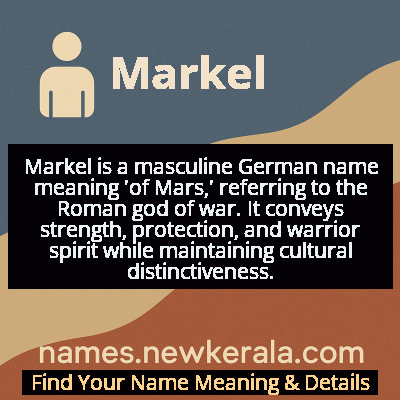Markel Name Meaning & Details
Origin, Popularity, Numerology Analysis & Name Meaning of Markel
Discover the origin, meaning, and cultural significance of the name MARKEL. Delve into its historical roots and explore the lasting impact it has had on communities and traditions.
Name
Markel
Gender
Male
Origin
German
Lucky Number
6
Meaning of the Name - Markel
Markel is a masculine German name meaning 'of Mars,' referring to the Roman god of war. It conveys strength, protection, and warrior spirit while maintaining cultural distinctiveness.
Markel - Complete Numerology Analysis
Your Numerology Number
Based on Pythagorean Numerology System
Ruling Planet
Venus
Positive Nature
Harmonious, responsible, caring, and artistic.
Negative Traits
Overly idealistic, superficial, possessive, or jealous.
Lucky Colours
Pink, turquoise.
Lucky Days
Friday.
Lucky Stones
Diamond, turquoise.
Harmony Numbers
2, 3, 9.
Best Suited Professions
Artists, musicians, teachers, healthcare workers.
What People Like About You
Warmth, nurturing nature, artistic flair.
Famous People Named Markel
Markel Susaeta
Footballer
Long-serving winger for Athletic Bilbao with over 500 appearances
Markel Bergara
Footballer
Professional midfielder for Real Sociedad and Eibar in La Liga
Markel Irizar
Cyclist
Professional cyclist who completed multiple Grand Tours including Tour de France
Markel Zubizarreta
Basketball Executive
Sports director for FC Barcelona basketball section
Name Variations & International Equivalents
Click on blue names to explore their detailed meanings. Gray names with will be available soon.
Cultural & Historical Significance
Extended Personality Analysis
People named Markel typically exhibit a compelling blend of strength and strategic thinking, reflecting their name's warrior origins. They tend to be natural leaders who approach challenges with both courage and careful planning. Their determination is often tempered by a strong sense of loyalty to family, friends, and principles, making them reliable and protective figures in their social circles. Markels usually possess excellent problem-solving abilities and can be quite persuasive when advocating for causes they believe in. While they may appear reserved initially, they form deep, lasting relationships built on trust and mutual respect. Their competitive nature drives them to excel in their chosen fields, whether in sports, business, or creative pursuits. Many Markels develop a distinctive balance between action and reflection, learning to channel their innate strength into constructive rather than confrontational approaches. This combination of attributes often makes them successful in leadership positions where both conviction and diplomacy are valuable.
Modern Usage & Popularity
In contemporary naming practices, Markel maintains a steady presence as a distinctive choice that balances tradition with modern appeal. While not among the most popular names globally, it enjoys consistent usage in Basque regions of Spain and among German-speaking communities. The name has gained some international visibility through prominent athletes, particularly in football and cycling, which has introduced it to broader audiences. In recent years, there's been a slight increase in usage among parents seeking strong, masculine names with cultural depth that aren't overly common. The name's easy pronunciation in multiple languages and its connection to classical mythology contribute to its cross-cultural appeal. Current trends suggest Markel may see gradual growth as parents increasingly value names with historical significance and international flexibility, though it's unlikely to become a top-ranking name in English-speaking countries.
Symbolic & Spiritual Meanings
Symbolically, Markel embodies the archetype of the principled warrior and protector, drawing deeply from its association with Mars, the Roman god of war. The name represents not just physical strength but also moral courage and the willingness to defend what is right. It symbolizes resilience in adversity and the capacity to overcome challenges through both determination and intelligence. Beyond martial connotations, Markel carries meanings of leadership, responsibility, and guardianship – suggesting someone who naturally assumes protective roles within their family or community. The name also implies a balance between action and restraint, representing the ideal of strength guided by wisdom. In a broader sense, Markel symbolizes the human capacity for transformation through struggle, embodying the journey from raw potential to disciplined power. These symbolic layers make the name particularly meaningful for those who value both inner strength and ethical commitment.

